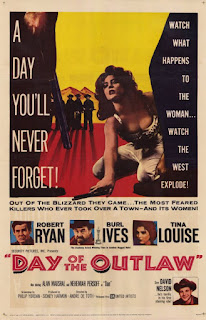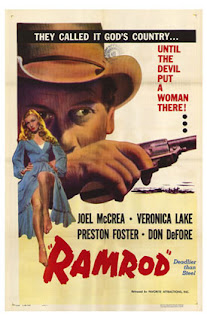I've had De Toth on my radar for many years. I put together the brief set of notes below a few years ago and should expand them into a more detailed account because I love this man's work: Important Hungarian/American director who made some significant Film Noir contributions and an impressive body of bleak Westerns many with Randolph Scott . Sarris includes De Toth among his “expressive esoterica” and fittingly describes his “most interesting films (revealing) an understanding of the instability and outright treachery of human relationships”. He is a master of tight, cramped action sequences in confined spaces.
DAY OF THE OUTLAW
Day of the Outlaw is an austere black and white western set in a small community in the bleakest of snow scapes where Burl Ives as a vicious outlaw on the run takes over until he is finally challenged by rancher Robert Ryan.. De Toth’s direction is as cold as the ubiquitous snow. Ryan, as usual, delivers a magnificent performance of contained steel; Burl Ives’s part is showier but no less well-judged. Their final shootout in a blizzard unleashes De Toth’s claustrophic mise-en-scene at its most extreme. Along with the ridiculously neglected Ramrod, this is De Toth’s greatest contribution to the western.
RAMROD
One of the most bitter of all range war westerns, Ramrod is an early example of Andre De Toth's muscular intensity that characterises all his work in the genre through the string of very satisfying Randolph Scotts in the 50s to the extremely bleak Day of the Outlaw (1959). Joel McCrea is just fine as the initially weak cowpoke who tries to keep peace on the range in the face of two rival camps, one led by rancher's daughter Veronica Lake (in a ferocious, chilling performance) and the other by tough hombre Preston Foster, who loves and is rejected by her.
De Toth handles the complex plot and screenplay with his usual sharp explorations of shifting allegiances and betrayals of trust; Don Defore's edgy performance as McCrea's erstwhile friend is pivotal in embodying the film's dark mood and tone which some commentators have labelled noir.
PITFALL
Pitfall is a low-key work about a very suburban, very married insurance claims man (Dick Powell) who is drawn into a dangerous relationship with noir icon Lizabeth Scott (in one of her most nuanced performances). Raymond Burr is around as a private eye equally infatuated with Scott. Jane Wyatt is the wife attempting to reclaim her husband from Scott's clutches. Like all of De Toth's better films, it’s about betrayal and shifting allegiances-its low key virtues are impressive.



No comments:
Post a Comment
Note: only a member of this blog may post a comment.